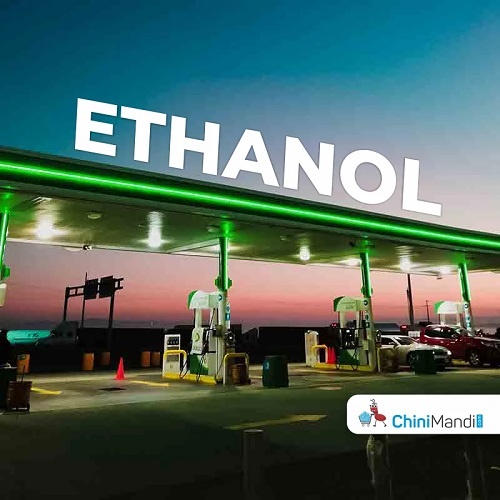India is one of the world’s biggest importers of petroleum products. It imports 82% of its crude oil from nations like Iraq, Saudi Arabia, the United States, the United Arab Emirates, etc and purchased 185 million metric tonnes of gasoline for USD 55 billion in 2020–21. India must expand its imports of crude oil each year since the nation’s petroleum reserves cannot keep up with the rising domestic demand.
The Indian government is looking into a number of solutions to the problem of rising oil and petroleum imports, including boosting the development of renewable energy sources and employing ethanol as a substitute for gasoline. By FY24, the government hopes to incorporate 20% ethanol into regular gasoline. Since ethanol is less expensive than gasoline, the government would be able to import less crude oil, saving about USD 4 billion annually. Additionally, using ethanol as fuel reduces environmental pollution since ethanol emits fewer pollutants than gasoline. Hence an aggressive target of blending petrol with 20% Ethanol has been targeted by 2025.
The government’s goal to gradually replace gasoline with ethanol and the bountiful supply of food grains and sugar cane are inspiring many businesspeople around the nation to look into the potential of ethanol manufacture and launch ethanol production facilities.
Let’s talk about the government incentives, the raw materials and equipment needed, and other variables involved in effectively beginning and running the ethanol production business to assist entrepreneurs who are going to set up ethanol production plants.
Government Assistance
The government offers financial support to business owners who want to build new distilleries or expand existing ones to make ethanol from sugarcane or cereals. The financial aid consists of interest subvention scheme, which basically reduces 50% of the interest charged by the bank for a period of 5 years. There is also a provision to sanction upto 95% of the project funding through banks. Only those businesses are eligible for the financial aid if they provide oil marketing companies with at least 75% of the produced ethanol.
The price of ethanol produced from sugarcane juice, sugar, and syrup was recently increased by the government from Rs. 63.45 to Rs. 65.61 per litre. The cost of ethanol produced using the C heavy molasses increased from Rs. 46.66 to Rs. 49.41 per litre. The cost of ethanol produced using the B heavy molasses route rose to Rs. 60.73 per litre from Rs. 59.08.
The prices will be applicable till 31st October, 2023. The Oil Manufacturing Companies will procure ethanol from ethanol manufacturers as per the above prices set by the government for the ESY-2022-23.
Raw Materials
The following raw materials can be used to start manufacturing ethanol:
● Rice
● Maize
● Jowar
● Pearl millet
● Sugarcane bagasse
But the EBP20 program currently gives subsidies for raw materials such as Sugarcane juice, B-heavy molasses, C-heavy molasses, maize and broken rice only.
Infrastructure and Machinery
The infrastructure and machinery required to start ethanol manufacturing include the following:
● Grain storage and cleaning plant
● Grain grading and milling plant
● Liquefaction plant
● Distillation plant
● Spent filtration plant
● Spent wash evaporator
● Cooling system
Apart from these, some of the other infrastructure required includes steam boilers, effluent treatment plant, etc.
Applications of Ethanol
In the current context, the primary application of ethanol is to blend with petrol and diesel. In addition to blending with petrol and diesel, ethanol is also used in downstream chemicals manufacturing and alcoholic beverages manufacturing.
Advantages Of Using Ethanol As Fuel
1. Ethanol fuel, with a 113 octane rating, is one of the best-performing fuels in the market. Oxygen present in ethanol molecules permits the engine to combust the fuel completely, leading to fewer emissions.
2. Ethanol-blended fuel acts as gas-line antifreeze and prevents the wintertime problem of starting a motorcycle.
3. It is considered a renewable fuel as ethanol is produced from plants.
4. As ethanol-blended fuel does not leave gummy deposits, it keeps the fuel system tidy for optimal performance.
5. The use of ethanol as fuel reduces demand for foreign oil.
6. Ethanol-fueled vehicles emit very little carbon dioxide.
Other By-Products
Extra neutral alcohol (ENA), distillers grains(DDGS which is a mian ingredient in cattle feed), carbon dioxide, etc. are a few of the main by-products created during the manufacture of ethanol. Alcoholic beverages, cosmetics, detergents, shampoos, paints, and other products are all made with ENA. The main component of animal feed is distillers grains. The generated carbon dioxide can be transformed into food-grade gas for use in carbonated beverages. Thus all these by products can further fetch good revenues for the Ethanol plant.
The demand for ethanol in the country is rising as a result of the government’s significant interest in blending ethanol with diesel and petrol. India will need 1,016 crore litres of ethanol to combine with petrol and diesel by 2025–2026. However, India now has a 684 crore litre capacity for ethanol production. The need for ethanol will rise rapidly, as it also has uses in the pharmaceutical and chemical industries. India has to increase ethanol production rapidly to keep up with the country’s rising domestic demand.
State Initiatives to Promote the Production of Ethanol
There are a few states such as Madhya Pradesh, Assam and Bihar that have additional incentives for setting up of Ethanol plants. The “Assam Ethanol Promotion Policy 2021” was announced by the Assamese government with the goal of luring investments and boosting the use of ethanol in the state’s transportation and energy sectors. The policy that offers financial incentives to businesses that produce ethanol will be in effect until March 31, 2026. The sectors that sell the produced ethanol to oil manufacturing companies will be the only ones eligible for the proposed incentives under the plan.
Bihar is another state in the country with a dedicated policy for the promotion of ethanol production. Bihar is the first Indian state to formulate a policy for ethanol production. The government offers up to Rs. 5 crore in financial incentives under the programme and permits the extraction of ethanol from maize, which was previously limited to sugarcane. In addition to Bihar and Assam, the state of Madhya Pradesh also implemented similar initiatives to encourage ethanol production to the tune of upto Rs.1.50 per litre. Many other state governments are also thinking about developing specific policies to support ethanol production.
Hence the time is ripe for setting up of ethanol plants in India and the deadline for getting the EC approval and DFPD clearance is by April 20th of 2023.
The opinions expressed in this column are of consultancy SolutionBuggy. The facts and opinions expressed here do not reflect the views of www.chinimandi.com













I would like to open a ethanol plant then how could I?
Hello sir
My self Ravi B Dungrani from Gujarat Can we start together??
is it possible to start 5000 LPD ethanol plant from rice in bihar and what would be TCI
We are located in Bhagwanpur Rurki Haridwar distt. Wants to set up a mini Ethanol plant. How can I move ahead.
We are located in sahaspur Distt. Bijnor . I want to set up a mini Ethanol plant. How can I start.please advise.
PRAMOD KUMAR JAIN SAT, 29JULY 2023 1.47PM
WE are located in Haldwani DISTT. Nainital. I WANT TO Set up amini plant of ETANOL . How can I start. and whatis the cost of plant and working capital and marketing
Ludhiana or ghaziabad main athenol ki factory ka kitna kharcha aayega or kaccha maal kaise milega kitni jagah paryapat rahegi investment kitha rahega starting main
We are finance & technical consultant of Ethanol plants in India please contact us if anyone wants to setup Ethanol plant, we provide end to end implementation support
Contact no: +91-7999372536
Iam much interested in Ethanol startup ,but I don’t have any idea for this startup. I don’t have enough 5% of funding. Please, can you help me for this??
Iam much interested in mini Ethanol startup ,but I don’t have any idea for this startup. How to proceed for setting up plant, expected finance required initially and provisions for government support for funding.expert may Please,
i am interested in ethanol plant , plz. contact
WE ARE HAVING 30N BIGHAS LAND AT TALERA IN BUNDI , RAJASTHAN . LAND IS IN SAFE WATER ZONE AND ONE PLANT IS INSTALLED 3 KM FROM OUR LAND . KINDDLY ADVISE FOR INSTALLATION AND CONSULTANCY .
PL ADVISE FOR INSTALLATION FOR ESTABLISHING ETHANOL PLANT IN BUNDI . RAJASTHAN , WHICH IS IN SAFE WATER ZONE . LAND IS AVAILABLE
mai Ithonal ka plant lagana chhatta hu pl suport us